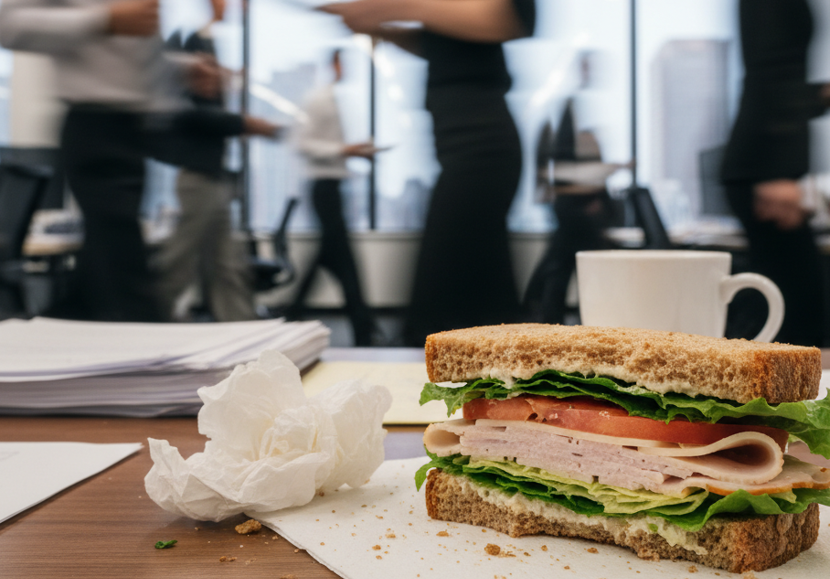An increasingly stale sandwich sits untouched on my desk while a mountain of various emails pile up in my inbox. Sound familiar to anyone? For thousands of women navigating high pressure corporate environments across the UK, their relationship with food is, to say the least, complicated.
Health and Safety Executive statistics from the 2024-24 period revealed that women have significantly higher rates of work-related stress, depression or anxiety than men. But there’s a darker side that rarely gets the spotlight it needs: eating distress.
One in four UK women workers say they’re currently unable to manage the levels of pressure and stress they’re experiencing at work. Women aged between 35 and 54 are particularly stressed, with nearly one in six of this group reporting being stressed every single day. We’re managing teams while managing households, hitting quarterly KPIs while helping with homework. Food becomes both comfort and enemy, control mechanism and chaos creator. (I know you know what I’m talking about, even if you have a handle on this.)
Between 1.25 and 3.4 million people in the UK are affected by an eating disorder, with women being the most impacted as I mentioned, Women with eating disorders face particular challenges navigating food centric work events such as lunch hours, unexpected workplace treats, celebrations with abundant food, and business meetings over meals.
One (anonymous) participant in our own workplace study confessed that she avoids the lunchroom entirely, saying that her feeling was her colleagues were watching and judging every bite. The business world’s obsession with wellness programs ironically exacerbates this pressure. When your workplace launches weight loss challenges while you’re secretly battling disordered eating, the disconnect feels insurmountable.
The HSE stats confirm that more than half of women in the UK are stressed at work at least once a week, for 23% it’s at least once a day. Workload stresses 53 %of women, while chronic stress has been associated with higher uncontrolled eating and emotional eating. Let’s not underestimate the massive impact stress has on the physiology of our bodies; worldwide, autoimmune diseases (of which stress is a huge trigger) are affecting women more than men at an 80:20 ratio.
Even more interesting is looking at a Crohn’s disease, an immune disorder that affects the digestive tract. In childhood the gender split for patients is close to 50/50. However, when women reach their early twenties the numbers sky rocket, with the vast majority of cases being women from this point forward. I’m not saying there aren’t other biologic factors in place here, but we can’t overlook the fact this is when many women are reaching new levels in their careers while trying to balance families and other responsibilities…
We reach for the biscuits at 3pm not necessarily from hunger but from being purely overwhelmed and looking for easy comfort. We skip breakfast because there’s no time, then binge on takeout after working late, which feels like a well justified reward (I am still guilty of this regularly). This cycle feeds itself (no pun intended), stress triggered eating patterns that create more stress and push the cycle on.
UK women aged 25 to 44 feel stressed for an average of 12.4 days in any typical, compared to 8.7 days for men. When we add financial worry as the top external stress factor that affects 41% of all employees, the pressure intensifies. Research commissioned by the charity Mind found that 1 in 5 of us will take a day off due to stress, but 90 percent will give our boss a different reason for the absence, this shows just how much stigma we still have around stress and self-care, especially at work.
So.. what actually helps? You can start by recognizing that eating distress isn’t about willpower or weakness. It’s a legitimate response to overwhelming circumstances. Let’s explore a few recommendations below:
Flexible work arrangements
Flexible working arrangements can significantly alleviate stress and improve work life balance, especially for women with caregiving responsibilities. Remote work options, flexible hours, even part time roles make a genuine difference over the long term.
Office fruit delivery
Creating healthier food environments matters too. Simple changes like office fruit delivery services provide accessible, nutritious options without the loaded messaging of diet culture. I’ll be talking more about this in a future post. A meta-analysis of 56 peer-reviewed studies on workplace health initiatives (e.g. office fruit boxes and the like) found an average 26% reduction in healthcare costs and a 27% reduction in staff absence due to sick days.
Adults who ate nutrient rich foods like fruits and vegetables showed reduced symptoms of depression and greater positive psychological wellbeing. Having fresh apples and oranges available beats vending machine runs every time.
Support networks specific to the office
Build support networks within your workplace. Regular one on one check ins between managers and team members provide space for employees to discuss challenges including those related to mental health. Yet only 32 percent of working adults say their workplace had plans in place to help colleagues spot signs of chronic stress and prevent burnout. Sometimes just knowing someone notices when you’re struggling makes the difference.
Professional support backed my management
Professional support remains crucial. Employee assistance programs offering confidential counselling services can give you somewhere to turn when food and stress becomes too overwhelming. Beat, the UK’s eating disorder charity, provides targeted help for the hundreds of thousands women and men affected. NIWE offers community support specifically for women balancing corporate demands with personal wellbeing.
A nutritious diet combined with mindful eating is important in combating stress. But mindful eating looks different when you’re scarfing lunch between meetings. Focus on progress not perfection. Bring snacks you actually enjoy. Take five minutes to eat away from your desk, even if that means hiding in your car. Small acts of self-care will accumulate into tangible wins.
Stress in the office won’t change overnight, but we can change how we navigate it. With work related stress costing the UK economy £28 billion annually, employers have recognised the need for change. Eating distress thrives in isolation and shame, it weakens when we acknowledge its presence and seek support, at home AND at work. Your struggle with food doesn’t define your professional worth. You deserve nourishment, not punishment, especially when work demands everything you’ve got.




